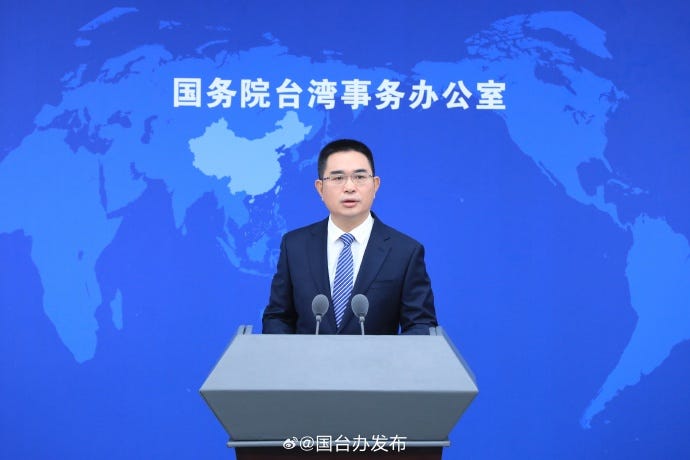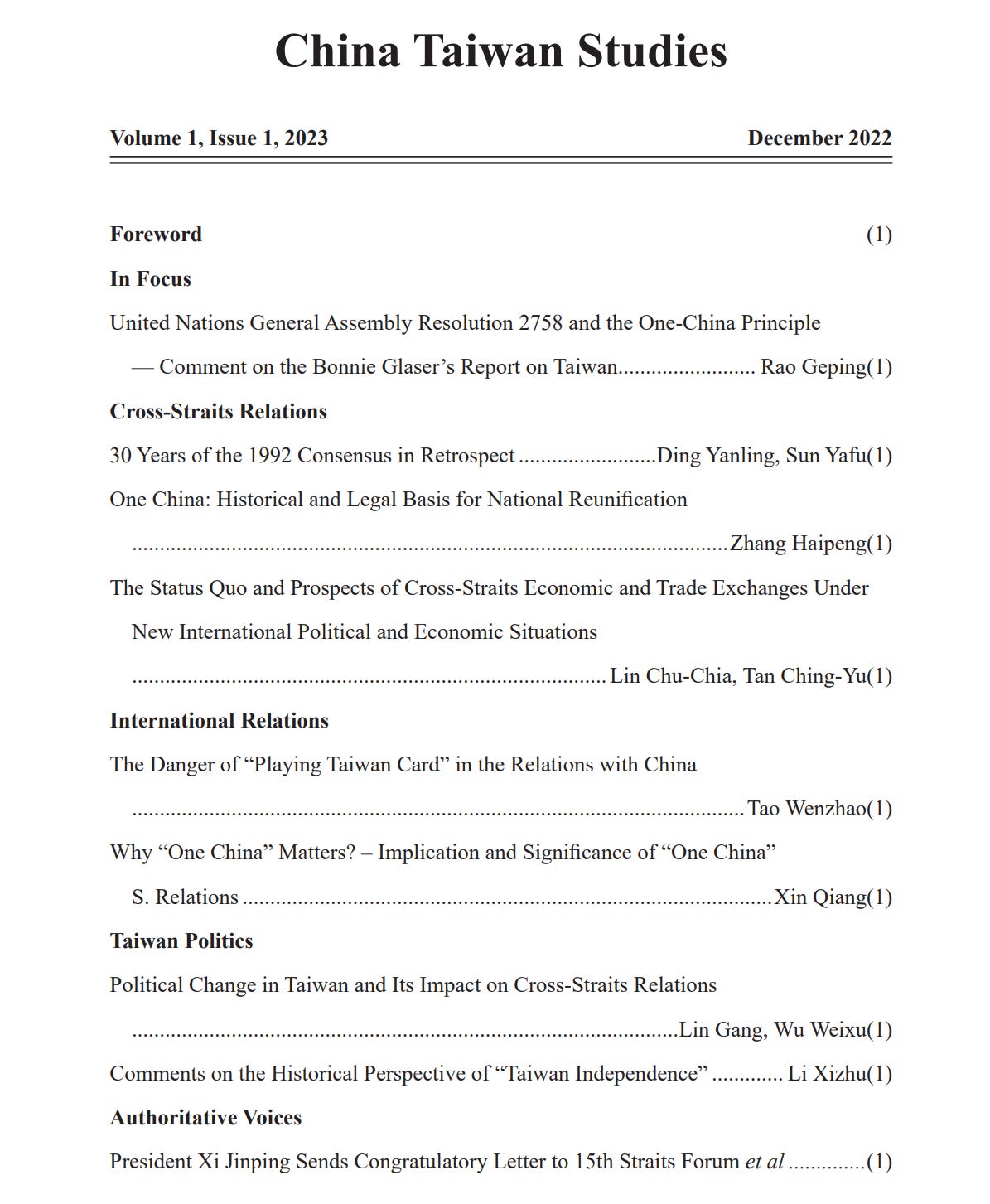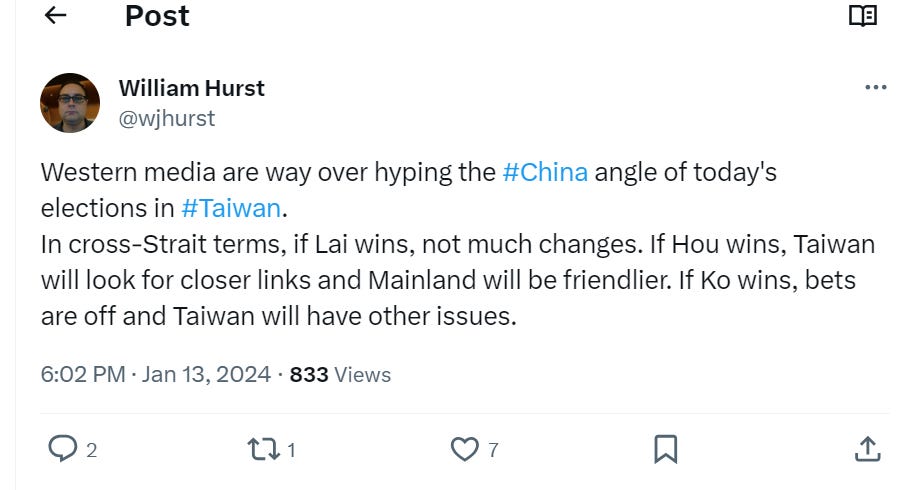Decoding Chinese mainland's response to Taiwan election results
Chen Binhua, a spokesperson for the State Council Taiwan Affairs Office, commented on the Taiwan election results on Jan. 13
The results of the Taiwan leadership and legislature elections were unveiled a few hours ago. Taiwan’s ruling Democratic Progressive Party (DPP) candidate Lai Ching-te won Taiwan's leadership election while his party lost its parliamentary majority.
As in past elections for the region's leadership, I found myself once again in front of the television, witnessing the voting day unfold in Taiwan – the casting and counting of votes, followed by the press conferences and statements from both the victorious and defeated candidates.
Just moments ago, 陈斌华 Chen Binhua, a spokesperson for the State Council Taiwan Affairs Office, commented on the outcomes of Taiwan leadership and legislature elections. I have included the full text of Chen’s comment here, along with the translation, and I did a quick analysis on the comment. In a nutshell, neither the election results nor the mainland's official response to the results offered any real surprises.
Full-text comment by Chen Binhua (Chinese & English)
国务院台办发言人陈斌华13日晚就台湾地区选举结果表示:
Chen Binhua, a spokesperson for the State Council Taiwan Affairs Office, commented on the outcomes of Taiwan leadership and legislature elections on Jan. 13:
这次台湾地区两项选举结果显示,民进党并不能代表岛内主流民意。台湾是中国的台湾。这次选举改变不了两岸关系的基本格局和发展方向,改变不了两岸同胞走近走亲、越走越亲的共同愿望,更阻挡不了祖国终将统一、也必然统一的大势。
The outcomes of Taiwan leadership and legislature elections reveal that the Democratic Progressive Party (DPP) cannot represent the mainstream public opinion on the island. Taiwan is China's Taiwan. The elections will not change the basic landscape and development trend of cross-Strait relations, will not alter the shared aspiration of compatriots across the Taiwan Strait to forge closer ties, and will not impede the inevitable trend of China's reunification.
我们解决台湾问题、完成国家统一的立场一以贯之,意志坚若磐石。我们将坚持体现一个中国原则的“九二共识”,坚决反对“台独”分裂行径和外部势力干涉,与台湾有关政党、团体和各界人士一道,促进两岸交流合作,深化两岸融合发展,共同弘扬中华文化,推动两岸关系和平发展、推进祖国统一大业。(完)
Our stance on resolving the Taiwan question and realizing national reunification remains consistent, and our determination is as firm as rock. We will adhere to the 1992 Consensus that embodies the one-China principle and firmly oppose the separatist activities aimed at "Taiwan independence" as well as foreign interference. The mainland will work with relevant political parties, groups and people from various sectors in Taiwan to boost cross-Strait exchanges and cooperation, enhance cross-Strait integrated development, jointly promote Chinese culture, and advance the peaceful development of cross-Strait relations as well as the cause of national reunification. Enditem
Analysis
1.
这次台湾地区两项选举结果显示,民进党并不能代表岛内主流民意。
The outcomes of Taiwan leadership and legislature elections reveal that the Democratic Progressive Party (DPP) cannot represent the mainstream public opinion on the island.
Lai garnered only 40% of the votes in Taiwan's first-past-the-post system, and his party lost its parliamentary majority. These outcomes provided the mainland with a straightforward basis for the comment, which I consider to be fair.
2.
这次选举改变不了两岸关系的基本格局和发展方向,改变不了两岸同胞走近走亲、越走越亲的共同愿望,更阻挡不了祖国终将统一、也必然统一的大势。
The elections will not change the basic landscape and development trend of cross-Strait relations, will not alter the shared aspiration of compatriots across the Taiwan Strait to forge closer ties, and will not impede the inevitable trend of China's reunification.
The "will not impede the inevitable trend of China's reunification" part is not new. Just two weeks ago, Chinese president Xi Jinping said in his 2024 New Year Address that “祖国统一是历史必然” “China will surely be reunified”, which is also aligned with what he said to President Joe Biden in San Francisco in November last year.
3.
我们解决台湾问题、完成国家统一的立场一以贯之,意志坚若磐石。我们将坚持体现一个中国原则的“九二共识”,坚决反对“台独”分裂行径和外部势力干涉
Our stance on resolving the Taiwan question and realizing national reunification remains consistent, and our determination is as firm as rock. We will adhere to the 1992 Consensus that embodies the one-China principle and firmly oppose the separatist activities aimed at "Taiwan independence" as well as foreign interference.
The mainland's position is that the 1992 Consensus is the political foundation for the development of cross-Strait relations and the anchor for peace and stability across the Strait. As I said in a post ten days ago, due to various reasons, the historical process of reaching this consensus requires extensive explanation, so I believe a paper on the 1992 Consensus from an English journal titled "China Taiwan Studies" by the 中国社会科学院台湾研究所 the Taiwan Research Institute of the Chinese Academy of Social Sciences (CASS) is valuable. In that post, I provided the full-text of the paper on the consensus online. Today, I uploaded all the papers in the inaugural issue of "China Taiwan Studies" via Google Drive for you to download and share.
4.
与台湾有关政党、团体和各界人士一道,促进两岸交流合作,深化两岸融合发展,共同弘扬中华文化,推动两岸关系和平发展、推进祖国统一大业。
The mainland will work with relevant political parties, groups and people from various sectors in Taiwan to boost cross-Strait exchanges and cooperation, enhance cross-Strait integrated development, jointly promote Chinese culture, and advance the peaceful development of cross-Strait relations as well as the cause of national reunification.
The "cross-Strait integrated development" parts remind me that in September last year, the Chinese government issued a detailed plan on making Fujian, a province situated on the southeast coast, a demonstration zone for integrated development with Taiwan. The document listed the general requirements and 21 specific measures for building the zone. It said the objective is to make Fujian 第一家园 the first-choice destination for Taiwan residents and enterprises to pursue development on the mainland. I have posted a full-text translation of the document and an interview with the Taiwan Research Institute on this document.
***
I am confident that numerous analyses will emerge soon regarding the election results. Below, I have curated a selection of relevant Substack posts, tweet and WeChat post that I guess you might want to read:
Taiwan influencers on Chinese social media
There have been conversations about how social e-commerce platform Xiaohongshu has become China’s battlefield for “cultural unification”, as it’s also widely used by youth in Taiwan. And now that users are disclosing their IP location since June 2022 under rules of the Cyberspace Administration of China, IPs in Taiwan must be showcased as “China Taiwan” across all Chinese social media.
"Intervention in the Election by the Communist Party of China (CPC)"
It is worth mentioning the "CPC intervention in the election" rhetoric proposed by the DPP or Lai Ching-te. Generally, it means that any information appearing in the election that is unfavorable to the DPP is fabricated. In this way, Luo Chi-cheng's indecent video is "deepfake" and is the embodiment of "CPC intervention in the election". Lai Ching-te himself had to come forward immediately to endorse Luo, accusing the "deepfake" and "CPC intervention in the election." Not only that, the 41-minute audio of Luo and Tsai that was heatedly discussed is also accused of being "fabricated" and "CPC intervention." It seems that "CPC intervention in the election" is an excuse that can explain everything.
But if people look at the video and audio, they will find such evidence is definitely real. First, they cannot be made with "deepfake" because all have solid content. Second, they cannot be targets of "intervention in the election." As has been analyzed by Chen Guoxiang, to put it most euphemistically, the DPP or Lai Ching-te also cannot remove reasonable doubts from the public. With further analysis, it is more likely that the video and audio are divulged by somebody within the DPP as a result of internal struggles. Lai Ching-te stood out to endorse Luo and used the excuse of "CPC intervention in the election," showing they are unscrupulous in their efforts to protect Luo. Perhaps they truly believe that all problems of the DPP can be covered by external excuses –– as if all Taiwanese people can be convinced with "CPC intervention," which is not too different from calling white black or "call a stag a horse" (a proverbial expression in Chinese, referring to distorted facts). This is seeing themselves as sages like Zhuge Liang (a statesman and strategist in Chinese history) and the public as fools, fundamentally despising the intelligence of the public and having no scruples about political manipulation.
Chong Hua Professor of Chinese Development William Hurst's tweet on the elections:
A piece titled "他上台了,又能怎么样?!He's in Power Now, But What Can He Really Do? " was published online on Saturday night by Youlieryoumian 有理儿有面, a very popular individual WeChat account featuring editorials on geopolitical shifts related to the Chinese government and society, such as the Russia-Ukraine conflict, the Taiwan question, and China-US relations. The piece says
不管是谁胜出,如果不能推动两岸的和平统一进程,就是台湾大选的失败,没有赢家。我们绝不能,也不会把台湾的未来寄托于一场选举的胜利者。
No matter who emerges victorious, if they cannot advance the process of peaceful reunification across the strait, it is a failure of the Taiwan elections, with no true winner. We absolutely cannot, nor will we, entrust the future of Taiwan to the victor of a single election.
That's all for today's writing. I keep waking Anna up with my typing and obviously she is not very happy with me now, so I need to go to sleep…








Does the DPP's vote share in this election actually signify any kind of a movement or consensus for reunification? Or are these election results a sign that a status quo must be maintained. Or are these election results merely a consequence of the complexities of genuine democracy with local socio-political/political economy factors playing a role? Unless one is tracking deep into Taiwanese politics and society, this analysis remains one-sided. It's mainland China's POV. It's very, very interesting, nevertheless.
Thank you for putting this in perspective. Since the DPP remains in power, not much changes. Their vote share plummeted from 57% to 40% over four years. Also TPP + KMT, which are not anti-reunification, got over 50% of the vote share, so it's clear where Taiwanese people stand on how geopolitics have changed over the past 4 years.